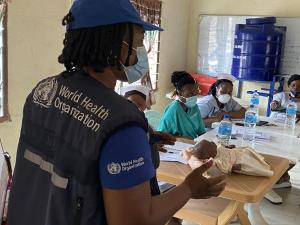WHO continues to build capacity of nurses for baby friendly hospitals in the context of COVID-19
The COVID-19 pandemic in Sierra Leone disrupted the health system, especially the delivery of routine services. As infection prevention and control measures are being practiced and monitored, the implementation of routine services has commenced in order to ensure the gains made over the years are maintained. In this regard, capacity building on Baby Friendly Hospital Initiative has commenced for maternity staff in the regional hospitals.
Hanna Yankson, WHO’s Nutrition lead stood in the front of a room, with a marker in the left hand and a flip chart standing on three feet to her left, while 10 nurses sat in a semi-circle almost around her, with a training manual on their desks, at the Bo Government Hospital in Bo city, ready for another round of training for a baby friendly hospital.
The Ministry of Health and Sanitation (MoHS) through its Directorate of Food and Nutrition is implementing the maternal infant and young child nutrition (MIYCN) programme as a prevention approach for child survival and development. According to the Sierra Leone Multiple Indicator Cluster Survey report, 2017, even with the progress made in improving infant and young child feeding practices, about 5 in every 10 infants (54.5%) are initiated to breastfeeding within an hour of birth.
The Sierra Leone Demographic Health Survey report on Key Indicators, 2019, revealed that only 52.4 percent of infants were exclusively breastfed up to 6 months of life. The report further states that 18 percent of infants are fed using a bottle with nipple, a practice that is discouraged because of the risks of illness to the child.
To promote, protect, support and sustain breastfeeding, WHO through the Saving Lives Programme funded by UKaid supported MoHS to establish and implement Baby Friendly Hospital Initiative (BFHI) in four Regional Government hospitals (Bo, Bombali, Kenema and Port Loko) and the University Teaching Hospital in Freetown (Princess Christian Maternity Hospital (PCMH) and the Ola During Children’s Hospital (ODCH).
In this session, Hannah introduced a role play training technique to demonstrate how nurses can help new mothers hold their babies rightly for breastfeeding. Among the participants, two nurses, one playing the role of a new mother and the other a nurse, perform safe methods of positioning and attaching babies to the breast while breastfeeding them as the others observed and ask questions.
“Our training sessions have been going on since 2018 with a total of 926 clinical staff trained of which 235(52.2%) have been trained from the Bo Government Hospital. But the COVID-19 emergency interrupted the frequency. However, we have picked up again and the aim is to attain 100% of trained staff in all the four regional and the teaching hospitals (PCMH/ODCH) in Freetown,” said Hannah.
The Baby Friendly Hospital Initiative (BFHI) focuses on protecting, promoting and supporting breastfeeding in facilities providing maternity and newborn care services. It focuses on providing optimal clinical care for new mothers and their infants. BFHI provides substantial evidence for implementing the Ten Steps to successful breastfeeding and can contribute significantly to improving breastfeeding rates. It also complements existing standards and guidelines for improving quality of maternal and new-born care in health facilities and optimal feeding of low birth-weight infants in low- and middle-income countries.




